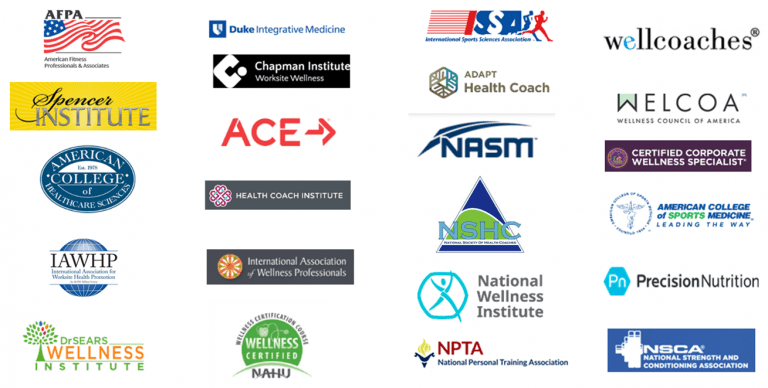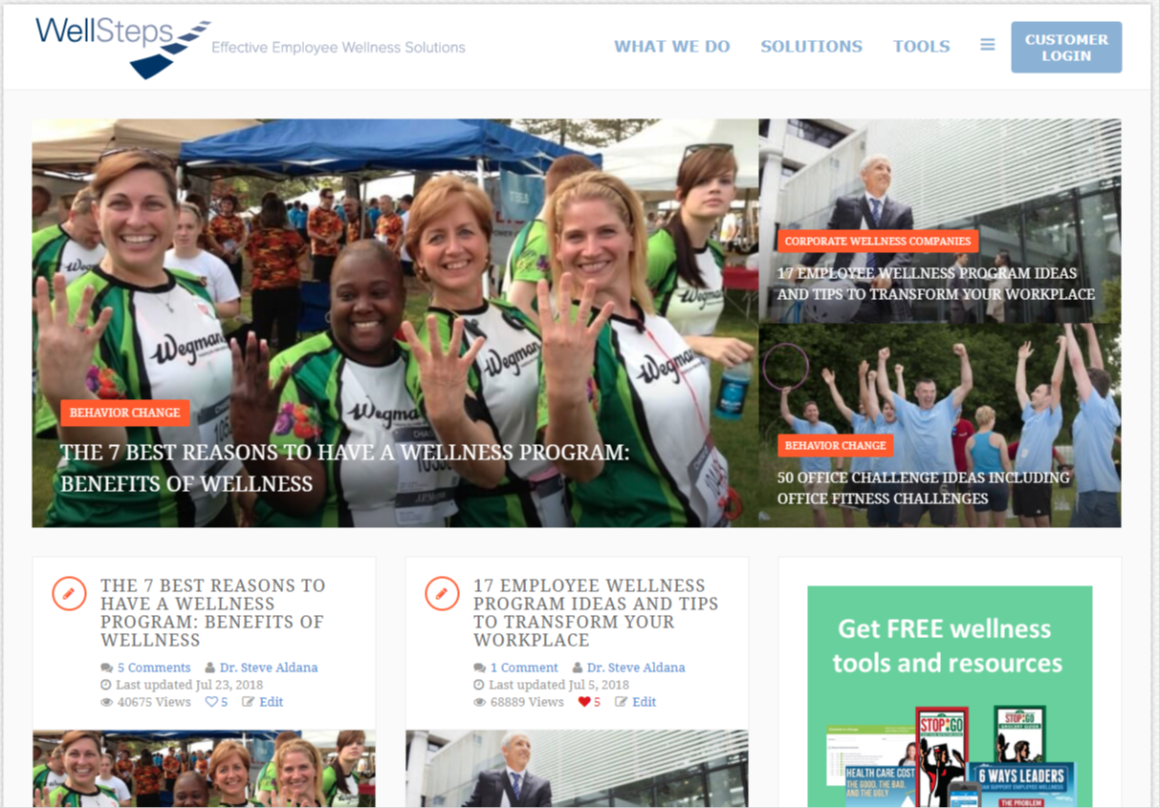So you want a wellness job as a corporate wellness coordinator. How do you find such a wellness job? Wouldn’t it be great if somebody would just publish directions to make it easier for you to get a corporate wellness job?
That is exactly why we wrote this blog. Unique qualifications come from someone who has interviewed for several health and wellness jobs, who has helped numerous college students launch their own health and wellness careers, and who now creates employee wellness jobs and conducts interviews. Buckle your seat-belt.
Just the same, about a dozen people were interviewed to make sure you got the most up-to-date, accurate content possible. If you apply these 3 strategies, you will have a competitive advantage in finding a wellness job including becoming a wellness coordinator.
If you carefully read each section and maybe even write down a few action items, you will dramatically increase your chances of landing any health and wellness job.

Strategy #1 Your Corporate Wellness Career Starts Well Before Graduation
Before you attend your first training, before you discuss your starting salary, and even before you interview; there is something you should know. Preparation for your first wellness or health promotion job should start before graduation. If you’re a student, you especially have time to apply this strategy. But if you’re a recent graduate, don’t worry, there is still time.
Knowing what you currently know – who would you rather hire – someone who graduated in 4 years with no work experience or who graduated in 5 years with work experience?
If you chose the person with experience, you’re not alone. Nearly all the people making hiring decisions base them on how well you sell your previous work experiences not on how well you performed academically.
It is true that grades can prevent you from getting an interview but they don’t necessarily help you get one. Nobody wants to work with a rookie know-it-all. But they do want to work with someone who is a workforce veteran. And it doesn’t matter what kind of workforce.
If you’re currently a college student, slow down and get a job or internship. This experience will be the most important thing on your resume.
So what kind of job you should get? Any job is good but if you’re lucky enough to attend one of the many Universities and Colleges that have wellness programs for their employees or even students, get a job in that program if you can or simply volunteer. This can even be a good internship.

Either way, priority number one should be to associate with and learn from the people who run the wellness or health education program. You can practice with mentors and ask them questions in a low risk environment.
It has been said that, “it’s not what you know but who you know that counts.” This is mostly true no matter what job you are looking for. Employers hire people they know or are familiar with.
If you work hard as a student and do right by them, former employers and managers will remember you. They’ll be there to help out when you need help with your resume, preparing for interviews, and even writing letters of recommendation. They may even offer you a job.
If you’re a student or even a new graduate still looking for your first wellness job, here are some other things you can do to set yourself apart.
Take a tour
If there are any wellness programs in your area, ask to take a tour. If you have to go to a larger city to access such programs, make it a road trip with some of your wellness homies!
Research the program before hand so you can ask intelligent questions during the tour. Make the tour all about the wellness program, not about you and what you want.
Attend any wellness professional event or conference you can.
I know of some students who volunteered to work the registration desk so they were able to attend an event for a reduced rate plus they got to meet everyone as they registered.
Remember, if it is really about who you know, you won’t meet anyone if you don’t go. Here are two professional conferences that will help you launch your career:

Subscribe to useful groups on LinkedIn.
For example, Wellness is a Business Strategy is a huge group with lots of decision makers in the wellness industry. Make a habit of going to LinkedIn once a week or so just to read some posts. That way, you will have a feel for what is happening in the field. You can also subscribe to other sources of information through the National Wellness Institute.
Strategy #2 How to Look for the Right Wellness Job Once You’ve Graduated
The most commonly mentioned platforms were LinkedIn and Indeed. Zip Recruiter and Monster were also mentioned, as was “my undergraduate school’s job search engine.”
Don’t forget to look at industry job boards maintained by organizations such as Wellness Councils of America. The Chronical for Higher Education is another great place to find wellness positions in schools and universities. These are fantastic sources for job leads.
Most people will simply apply for a wellness job through LinkedIn or Indeed because it is easier and quicker. This is a great strategy… if you want to tell your parents you applied for jobs so you can continue to play video games in their basement!
But if you want to actually get a job in the wellness industry, you have to work a little harder than that. Job sites like LinkedIn, Indeed, and Monster are really just filters.
They will take your application, allow you to upload your resume but the person making hiring decisions usually has to remember to login to those sites to check out all applicants.

The savvy applicant will learn about a job on one of the job sites mentioned above. Then they will do these things – and this is the secret sauce. They will spend a significant amount of time learning about the company including mission and objectives.
They will call people they know until they find someone who can tell them about the position. Armed with information about the company and the position, they will tailor their resume to the job duties outlined.
Then they will apply directly to the company. Using a good, better, best approach: it is good if the resume goes directly to the person who will review it; it is better if you have that person’s email address so you can follow-up; but it is best if you can somehow manage to hand deliver the resume.
Here are a few other strategies that might help you stand out as you search for a wellness job.
Use word of mouth.
Some of your personal contacts work in the wellness industry or know people who do. Connect with them, reach out to the wellness coordinator, and ask intelligent questions that you’ve carefully thought about and prepared in advance.
People never call… so call!
About a week after submitting your resume call and introduce yourself then say, “I submitted a resume last week and just wanted to double-check that you received it.”
Unless the person with whom you’re speaking says that they know exactly who you are (not likely), say something like, “It’s all good, would it be alright if I sent you another resume just to be sure?”
Of course they will say yes, then you can say, “so just look for a resume from – insert your name here.” This simple process will allow you to get your resume to the top of the pile. Plus someone on the inside has heard your name twice!
Finally, if you didn’t get the job, remember the value of a thank you card. After all, reviewing resumes and interviewing candidates is a pretty thankless job!

Be able to explain why you chose wellness as a career option.
This will likely go back to when you chose your wellness or health promotion major in college.
You should be able to eloquently relate some of the following: why a holistic versus treatment approach seemed to resonate with you, how choosing a wellness lifestyle became a personal victory for you, why helping people change was attractive to you, and how passionate you are about wellness.
It has been said that nobody gets rich by going in to wellness. The people with whom you’re interviewing will know that but they will want to feel your passion. They will want to know that you will love wellness as much as they do.

Strategy #3 What about Wellness Certifications?
During the interviews to write this blog, a surprisingly large number of people said “I was going to get this certification BUT…” insert reason here.
When further questioned, one of the interviewees said that her work experience helped her get the job she wanted before she was able to get certified. That is a good problem to have!
Having a certification is always a good idea because it adds color to your job and academic experiences. For most jobs, however, a certification is not required.

Getting one won’t hurt your job prospects, but it many cases it may make no difference. Actual wellness job experience is always the most important qualification.
If you do decide to get a certification it is also important that you consider continuing education costs in terms of time and money. Here is a list of certifications along with some tips.
- College student options: If you really want to work in a corporate wellness program, why not add a minor in business? The course content will help you understand business terminology quicker and will likely help you develop a broader perspective especially if you are required to take a class in organizational behavior.
- CPR and AED certification: It is best if you take a class in college that provides these two certifications. If not, you can always get these skills from an organization like the American Heart Association for less than $50.
- Personal training or group fitness certifications: The certifications offered through the American College of Sports Medicine are highly recommend. Many interviewees also mentioned the certification offered through the National Academy of Sports Medicine and American Council on Exercise.
- Wellness Practitioner: A great and widely recognized certification is the one offered through the Wellness Council of America. An excellent but more advanced certification is offered through the Chapman Institute and is called WellCert.
- This blog is part of the WellSteps Worksite Wellness blog series which contains the most current and real-world practices in wellness. They are required reading for all WellSteps employees. If you don’t have the time or money for a wellness certification, review the content of these blogs. They are free and when you are done, you’ll have consumed a semester’s worth of wellness best practices. Here are many of the blogs in a book format.

Common questions about wellness coordinator jobs
So what do people with wellness jobs do?
This all depends on the wellness program to which you were hired. Wellness programs take on many different forms. Some programs have onsite gyms but many do not. The people we interviewed for this blog mentioned personal training at gyms, health coaching in person or via the phone, working in or through Human Resources, being a wellness team member in a business environment with no gym, etc. The bottom line is that anyone employed in a wellness position anywhere is working to help people improve.
Interested in becoming a health coach? Check out our list of the 22 Best Wellness Certifications, Personal Training, and Health Coaching in 2024.
How much do wellness jobs pay?
Again, this depends on the specifics of the job, but starting salaries should be around $30,000-40,000 per year. Wellness jobs that require a masters degree will start higher. Salaries will vary depending on the responsibilities, the wellness program, and even the region of the United States. Again, people don’t go into wellness to get rich!

So What?
Wellness programs are more popular than ever. Many trend spotters identify wellness as a long-term growth industry. These new jobs will need qualified workers who love helping people improve.
The best thing about a wellness job is the satisfaction of knowing you spent your time and energy helping people have long, healthy lives.
[maxbutton id=”1″]
